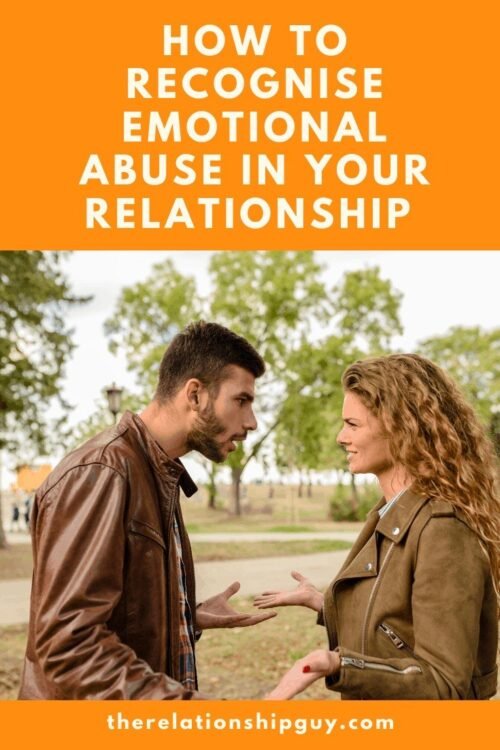Emotional abuse is also called psychological abuse or mental abuse and is a form of violence against an individual that is characterised by exposing someone to behaviour that will result in psychological trauma or injury.
But, even though this type of trauma can result in anxiety, chronic depression or post-traumatic stress disorder, emotional abuse can be subtle and difficult to recognise.
The aim of this post, therefore, is to help you recognise the signs of emotional abuse so you can take steps to protect yourself or a loved one.

Emotional abuse tends to erode a person’s feelings of self-worth and chips away at the happiness you deserve.
Unfortunately, however, this is also a type of abuse that is insidious and difficult to identify and for the abused even more difficult to leave.
In fact, in many cases, you and your abuser may not even know this type of abuse happening as it’s just a “normal part of your relationship.
In some cases, some women believe that they actually deserve what is happening to them, which makes the situation even more difficult.
Other times, some women believe that it’s too difficult to get out of the relationship, they have too much to lose, they have invested too much already, or they’ve dealt with the circumstances so long that it’s just become a part of their everyday life.
Some relationship researchers refer to this as the issue of “investment” which is often the reason behind why some women (and men) struggle to leave a bad relationship.*
Fortunately, though, there are some signs you can look out for that could indicate that you may be in a relationship in which you are experiencing psychological or mental abuse.
And if you can identify these characteristics in your relationship it might be time to get help from a professional because everything you do has consequences.
If you stay without helping yourself, there is a high likelihood that you might end up experiencing even more trauma and injury.
Worst-case scenario, you choose to ignore and forgive time and time again only to eventually become the unfortunate victim of escalated abuse.

Just think about it.
OK, so what signs do you need to look out for to know whether you’re being emotionally abused?
3 Main Ways Emotional Abuse Often Manifests Itself
Isolation
Sometimes, a person in a relationship can become possessive.
A possessive person tells you he cares for your safety, and that their possessive behaviour proves that they love you.
But taken to the extreme, possessiveness becomes isolation.
And the goal of isolation is to control you by breaking down your emotional will to resist.
Now, the desire to isolate could be caused by your partner’s insecurity.
They may project that insecurity onto you by trying to control everything you do, who you meet, who you communicate with, who you’re friends with, and where you go.

And in the process, they may even try to make you feel guilty for enjoying yourself, making friends, or wanting any form of life apart from them.
Verbal abuse
Another common sign of emotional abuse is verbal attacks.
These frequent verbal attacks are aimed at your character and value which ultimately ends up destroying your self-esteem.
Moreover, these continuous verbal assaults may also cause you to put aside your most important ideals, values and beliefs which causes you to lose touch with yourself.
Now, how do you recognise verbal abuse?
Verbal abuse is usually characterised by constant critical or humiliating remarks about you as a person. It aims to break you down.
TheRelationshipGuy.com
So, if your partner continuously puts you down and makes you feel unworthy of self-respect, this is a huge warning sign that something is definitely wrong.
It’s also important to know that verbal abuse could escalate into sexual or physical abuse if you avoid taking action to protect yourself.

Financial abuse
The third major sign of emotional abuse can come in the form of financial abuse.
For unless you’re financially independent, your finances can become vulnerable to a partner with abusive tendencies.
They may deny you access to funds, refuse to allow you to work outside the home, or spend money, and even blame the financial struggles on you.
This can be a tad more subtle than other signs of emotional abuse, but the key difference between prudence or stinginess and abuse is the underlying desire and attempt to “control.”
It’s one thing to be cautious with money or have certain beliefs around gender roles, but it’s quite another to want to exercise control or manipulate someone else with finances.
Now, maybe at this point, you’re still unsure.
Are there any other signs of possible emotion abuse you need to be aware of?
Answer the following questions for further clarity:
- Does he humiliate you in public?
- Does he tell you that you are too sensitive although you don’t believe you are?
- Does he control your spending, the money and pay all the bills?
- Are you afraid of his reactions?
- Do you feel you need to ask permission to do something? [Not to be confused with telling him what’s happening for the day to be sure he didn’t have plans to do something with you.]
- Does he believe he’s always right and you are always wrong?
- Does he share your personal information with others?
- Does he pout or withdraw from you to get what he wants?
- Does he tell you that your dreams are worthless?
- Does he devalue your work/job/career?
- Does he call you names or make cutting remarks under his breath and then deny that he said it?
- Does he openly flirt with other women or have extramarital affairs?
- Does he try to isolate you from friends and family? [Ask them if you aren’t sure – they know.]
- Does he appear to enjoy reminding you of your shortcomings?
- Does he blame you for his problems?
Now, my opinion on this is that if you can identify any of these in your relationship, or anything similar, it’s probably time to get help from a professional.
Because even though there are times when you can repair and heal the relationship when both people are committed, there is also a time to start considering your next move.

Next Steps
If you’re the victim of continuous emotional abuse within your relationship, the most important steps are to recognise the abuse and know that it is wrong.
Now, this can prove to be a challenge for anyone who has been emotionally bullied over a period of time.
It could be hard.
But it’s important to remind yourself that you are worthy of respect, and you can live a life that is free from the emotional abuse of your partner.
You deserve to be in happy, healthy and intimate relationship with a partner that values and adores you.
Think honestly about your relationship and ask yourself these following questions:
- Does your partner show, by their words and actions, that they love you and value you?
- Do they seek your opinion as someone who has much to contribute?
- Do they raise their voice and criticise you often, while hardly ever providing words of affirmation that lift you up?
What do your answers tell you about your relationship, right now?

If you’re in an emotionally abusive relationship, now is the time to take steps to change your circumstances.
Seek out people who build you up and affirm that you’re valuable, and spend time with them.
Or consider couple’s counselling, if you think things can be salvaged, so you can change the way you relate to each other.
Protect Yourself
If you do decide to leave an emotionally abusive relationship, it’s important to take precautions to protect yourself.
If you choose to walk away, remember that the abuse may continue.
Consider taking the following steps to protect yourself:
- Contact law enforcement officials and inform them about your situation. Request a restraining order or other protection against attacks from your partner (in extreme cases with a real possibility for physical harm).
- Don’t disclose the location of your new home.
- Set up a security system in your new home.
- Where possible, advise your neighbours of your current situation, and enlist their help in watching out for signs of trouble.
Take Away
Most of all, remember that you are valuable.
Anyone who makes you feel otherwise can only do so if you let them.
Enlist the help of emotionally strong, positive friends.
Take action.
Protect yourself.
Replace emotional abuse with strength and confidence in your self-worth.
In the end, you will emerge stronger and happier when you begin to take these steps today.
*References:
- Rusbult, C. E., Martz, J. M., & Agnew, C. R. (1998). The investment model scale.
- Rusbult, C. E., & Martz, J. M. (1995). Remaining in an abusive relationship: An investment model analysis of nonvoluntary dependence. Personality and Social Psychology Bulletin, 21 558-571.

